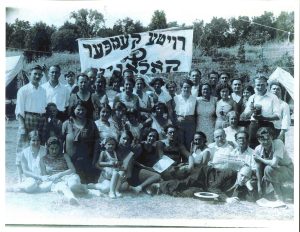Michael Fraiman
Reg Hartt began screening Triumph of the Will, Leni Riefenstahl’s distressingly seminal 1934 documentary of a rising Nazi Germany, around downtown Toronto in the 1970s. He is neither a Nazi nor a Jew, but has been mistaken for both.
After one packed screening in his living room at 463 Bathurst St., a man sitting near the front asked him: “Are you a Jew?” Hartt lied and said yes. “I knew it,” the man sneered, and launched into a violently anti-Semitic rant that shocked and silenced the crowd.
Hartt smiled calmly in response and said nothing. He’d been watching the man’s son, who’d been so embarrassed by his father’s hatred that he’d awkwardly shifted away from him as much as possible.
“His son had never seen that ugliness for what it is until that moment,” Hartt later recalled to me. “And the father was doing more to separate his son from that belief than anything I could do, or anything anyone else could do in a million years.”
Every Tuesday in April, auspiciously coinciding with Yom HaShoah on the eve of April 27, Hartt has screened Triumph of the Will as part of his Power of Propaganda Film Festival at the Cineforum, the downtown townhouse-cum-indie-theatre he’s been running for decades. It’s meant to coincide with Hitler’s birthday.
“It’s important not to get emotional,” Hartt said, remembering the anonymous death threats he’s received for screening the acclaimed Nazi propaganda.
“It’s like a surgeon going in to cut something in a patient’s body that has to be removed – it may look flipping disgusting, but he cannot afford to get emotional when he sees that… This is one of the things that people forget when they get all caught up in, ‘Oh, this is disgusting.’ Well, yes it is, OK, fine. But we’ve got to deal with this.”
Modern Jews are inching closer to the uncomfortable reality that, pretty soon, there will be no more Holocaust survivors. Once that happens, the link is severed – “Never again” will become completely abstracted. We’ll understand the Holocaust exclusively through theories and history books. But what do middle class Jews know about concentration camps? What does a 10-year-old kid know about honouring the dead? How can we remember something we never saw?
Last November, I visited Berlin’s famous Jewish Museum. It’s gorgeous and fluidly designed, but nothing hits harder than the Holocaust Tower, a powerful art installation by architect David Libeskind.
It’s basically an enormous and empty stone triangle prison shooting up from an unheated basement, unlit but for a single sliver of daylight 20 metres overhead. It’s truly terrifying. Once you’re in it, you immediately feel hopeless and afraid. If you’re in there alone, like I was, the isolation is palpable.
We don’t get that in school. We can watch Spielberg documentaries and listen to survivor interviews all we like, but if we want to really grapple with the horrors of the Holocaust, we need something closer to experiential learning. We need to be engrossed by the essence of evil. We need to stare into the eyes of Hitler and see Hitler staring back.
This is a growing trend across the world. Consider the bold and unsettling wave of Israeli teenagers tattooing their grandparents’ concentration camp numbers on the inside of their forearms.
“All my generation knows nothing about the Holocaust,” 21-year-old Eli Sagir explained to the New York Times in 2012. “You talk with people and they think it’s like the Exodus from Egypt – ancient history. I decided to do it to remind my generation: I want to tell them my grandfather’s story and the Holocaust story.”
It’s an unbelievable gesture, to say nothing of the fact that Israeli high school students already make pilgrimages to Polish and German concentration camps, an experience I’m sure is far more unsettling than my own moment in an art installation.
But we’re limited as Canadians, emotionally and physically, and that makes it easier to fall into complacency.
We have to rattle ourselves out of that. If we can’t fly to Germany, let’s bring Germany to us: facing Nazi propaganda at its purest offers an unfiltered look at actually understanding the whole mess of 70 years ago, like why beleaguered postwar Germans would believe in hailing their messianic leader.
It paints his portrait beautifully and proudly, and only by confronting that directly can we understand what we mean when we say, “Never again.”






